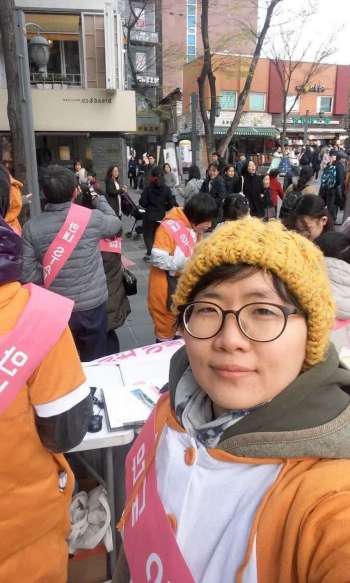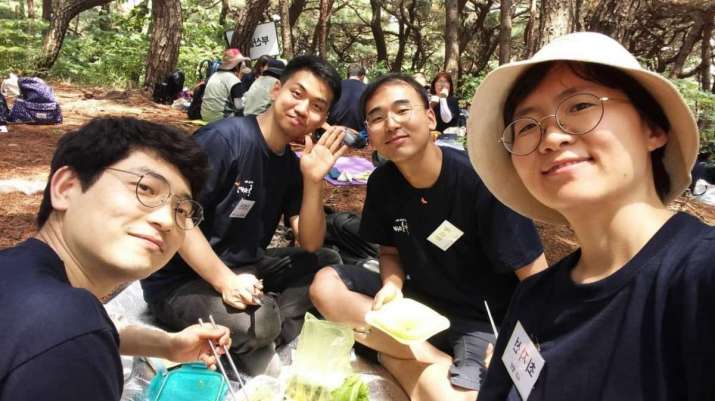I was 23 years old when I first came to know about Jungto Society in 2013. Raised as a Catholic in Korea, I did not know much about Buddhism until one day, a friend of mine invited me to a talk by Venerable Pomnyun Sunim on his newly published book, A New Century. It was about how to peacefully handle the relationship between the two Koreas. I had not heard of Jungto Society or Ven. Pomnyun Sunim before. Neither did I know that attending the talk would change the course of my life.
Listening the talk, my mind was blown away by Ven. Pomnyun Sunim’s simple yet wise perspective. I had studied political science at university, but never before had I heard anybody compare the North Korean government to a shabby gentility and its South Korean counterpart to someone who has suddenly become rich, as a way to analyze the underlying psychology between the two sides. Sunim emphasized that it was important for both sides to understand each others’ backgrounds and needs in galvanizing dialogue. It is a great pity that policymakers do not share his point of view.
The following year, I signed up for a year-long entry-level Buddhism class called Jungto Dharma School and an education program at the Peace Foundation, an NGO founded by Sunim and dealing with peace on the Korean Peninsula. Ven. Pomnyun Sunim is a well-known figure in South Korea. He founded Jungto Society in 1988 as a self-sufficient community of Buddhist practitioners. The number of Jungto members has grown to a few thousand over the course of decades, and I was surprised to learn that the people I met in Jungto Society are some of the most devoted social activists.
Jungto Dharma School and the Peace Foundation are run by Jungto volunteers—ordinary people whom you might meet at work or as neighbors. But they come to Jungto temples and offices after work or on weekends to volunteer their time and effort. In addition to spreading the Dharma through online video courses, they organize people to take action toward bringing peace between the two Koreas at the Peace Foundation.
 The author and Jungto society volunteers campaign for peace on the Korean Peninsula, April 2018. Image courtesy of Jee Seun Choi
The author and Jungto society volunteers campaign for peace on the Korean Peninsula, April 2018. Image courtesy of Jee Seun ChoiThrough affiliated groups Good Friends and Join Together Society, Jungto undertakes emergency relief and education work across Asia, including North Korea, the Philippines, India, and Myanmar, to mention a few. There is also an environmental organization, Ecobuddha, which focuses on everyday environmental practices, such as the zero-waste movement. All of these organizations are run by thousands of dedicated Jungto volunteers.
At first, it was hard for me to understand what motivated them. In the end, we are living in a capitalistic society in which time and energy is translated into money. We are taught that money is power and that choices that bring us more money are always the better option. However, these people were gladly giving up their time, energy, and even money to volunteer at Jungto.
After becoming a volunteer myself, I could understand a little better. Ven. Pomnyun Sunim teaches that a bodhisattva is someone who has made up their mind to become an enlightened being. Yet he or she does not do so alone: a bodhisattva does not “leave for heaven” before they have saved the last suffering sentient being in this world.
A Jungto practitioner wakes up at 5am everyday to pray. The ritual includes chanting, 108 prostrations, and reading the vows and objectives of all Jungto practitioners. The first objective goes: “We free ourselves from suffering and serve our neighbors and the world.”
There is another concept called “unification of labor and practice.” To a bodhisattva, opening online Buddhism courses or cooking meals for other Jungto volunteers is not labor; it is a method of practice, something that he or she does to gain one’s own enlightenment.
After Jungto Dharma School, I found myself reorganizing my working hours and even job preferences to volunteer for Jungto. There are many other dedicated young people who do likewise. Some even become full-time volunteers and live in the sangha.
That’s not to say that being a Jungto volunteer can’t be tough from time to time. Sometimes I would compare myself with my peers who had more money or seemed to be progressing faster in their lives and their careers. Whenever I feel that way, I remind myself that volunteering at Jungto is also for my own interest and benefit.
While some of my personal problems are caused by my own stress and greed, others are the result of modern social structures. This “common kharma” affects every individual in society. For example, for people living in South Korea, the division between the two Koreas not only affects our physical safety, but also puts a lot of pressure on our politics, our economy, our education, and gender equality as well. That is just one reason why a bodhisattva should try to make society a better place for everyone.
Ven. Pomnyun Sunim says he is experimenting to create “an alternative model” to capitalism through Jungto Society, to counter its innate exploitation of both humans and nature. Sunim’s recent projects include organic farming and recycling, although Buddhist practice is always at the center of this experiment.
People often ask Ven. Pomnyun Sunim what we should teach our children today, when the future is so unpredictable and even with knowledge we can be powerless. He says simply: “Practice.” Looking back over my eight or so years of involvement with Jungto, I have indeed become happier, more creative, and more compassionate. I wish others could also benefit from Buddhism, for the benefit of the world and for the benefit of all sentient beings.
See more
Pomnyun
Jungto Society
JTS Korea
Related features from Buddhistdoor Global
No Poverty: The Sustainable Development Goals and Buddhism
The Hungry Should Eat: JTS Brings Buddhist Compassion and Relief to India
Engaged Buddhism: Seon Master Pomnyun Sunim Pledges 10,000 Tons of Food Aid for Children in North Korea
Engaging with Suffering, Realizing Freedom: An Interview with Ven. Pomnyun Sunim
Buddhistdoor Global Special Issue 2021: Humanity in Transition
















